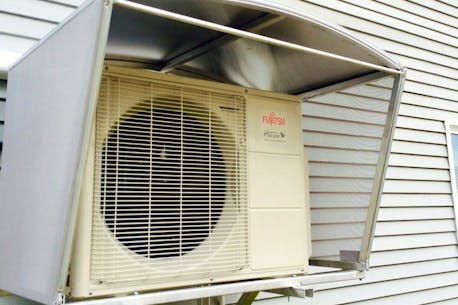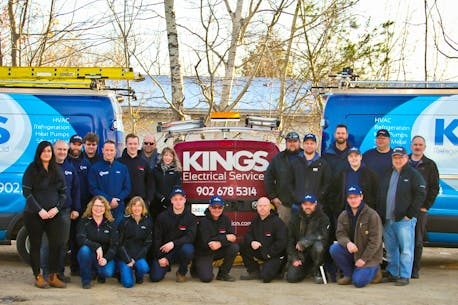HOW TO: Be smart with decisions about heat pumps in order to make your home as energy-efficient as possible
Having recently faced very high electricity bills, many families are seriously considering the possibility of installing a heat pump.
However, the options and information can be overwhelming. There are so many different brands and installers to choose from that it’s difficult to make a decision.
And after all that, does installing a heat pump actually save money?
What is the cheapest and most efficient method of installation, especially for low-income households, and what are the grants, rebates, and financing options?
Luckily there are people who can give good advice.
Jordan Pelham from Halifax is one of them. He operates JP Electric, which is listed on the Efficiency NS affiliate site, the NS Power Heat Pumps site, or through the NS Better Business Bureau. JP Electric serves Halifax and the surrounding area up to 30 minutes away. Although his company has only been in operation for a little over three years, he has worked in the industry for over 10 years.

Factors to consider when buying a heat pump
Pelham said there are many factors to consider when looking for a heat pump:
- For example, if you are looking for the highest efficiency rating, then look for either HSPF (Heating Seasonal Performance Factor) or SEER (Seasonal Energy Efficiency Rating).
- If you’re looking for the best warranty, some places offer a 12-year warranty, but most high-end devices come with a 10-year warranty.
- When you buy a heat pump that qualifies for the federal Greener Homes Grant, you don’t need to do too much research because if they qualify, you know it’s a good piece of equipment.
If you’re comparing two devices that are eligible for the rebate, Pelham recommends comparing the prices and warranty, because that’s really all that matters at this point. Their electric bills won’t vary much (maybe $5 to $10.00) from one brand to another if they qualify for the rebate, so price is really the only factor there, Pelham says.
However, if you are purchasing a heat pump that does not qualify for a rebate then the HSPF and SEER rating is the only thing that will tell you the quality of that unit.
Where can you buy a heat pump
There are some units that you can buy online. In some cases, they’re a quality unit, but the warranty is usually rubbish, Pelham warned.
If you’re buying a heat pump in Dartmouth, he added, you can also pick up my parts to fix in Dartmouth. On the other hand, if you order a heat pump from Amazon from Quebec, Pelham guarantees that getting parts won’t be very easy.
For example, he once had to wait two months for a compressor from Quebec for one of these online heat pumps. On the other hand, he could usually pick up the same part from his wholesaler in Dartmouth on the same day.
You should only want to buy a heat pump online if the ratings (HSPF and SEER) are good. But you probably won’t get a greener home rebate for a device you bought online, he warned, because to get the rebate you need to buy the device from a licensed installer, not just have a device you bought installed .
Overall, Pelham says brand doesn’t matter. People will preach you need a Daikan, Fujitsu or Mitsubishi but he said those are just expensive units.
“I’ve found leaking coils on as many Mitsubishi heat pumps as I have on direct air units,” he said.

Discounts for heat pumps
Anyone, regardless of income, can get rebates, Pelham says.
For the provincial discount (via Efficiency Nova Scotia) all you have to do is go to the website and fill out the application. Your installer must provide you with an invoice that conforms to Efficiency guidelines.
The provincial rebate is $200 per 12,000 BTU for a ductless mini-split (a wall-mounted, non-ducted heat pump) and $400 per 12,000 BTU for a central duct heat pump.
The Greener Homes discount requires an energy assessment prior to installation. See the Efficiency website for information. The Greener Homes rebate is typically $5,000 for a ducted central heat pump installation (any size) and $2,500 for a two-head mini-split installation and $5,000 for three or more heads.
Again, Pelham reminded that if you don’t already have heat pumps, anyone can qualify.
The Home Warming program offers a free energy assessment to those on lower incomes and potential upgrades for income-eligible homeowners.

Cleaning a heat pump
Pelham recommends cleaning the filters in your heat pump once a month.
The head can usually pop open or they are sometimes on top. He suggested regular deep cleaning every two years for pet owners and every three years for non-pet owners. That being said, there really isn’t any regular maintenance for these things, Pelham added.
In terms of deep cleanings, there are now many companies doing it that are cheaper than HVAC companies, he noted.
operation of a heat pump
Pelham said you should never turn off your heat pump if it’s the heat source in your home. Set it and forget it is the best motto.
For example, if you like it on 21 in winter, set your heat pump on heating and on 21. If you like it on 20 in summer, set it on 20 on cooling and leave it alone.
Auto mode isn’t necessary unless you want to be at a specific temperature all the time. In Auto mode, the pump will do whatever it needs to do to reach the temperature you set. That sometimes means heating or cooling in the same day, which isn’t good in terms of efficiency. It’s also not good for your heat pump to switch from heating to cooling like this, Pelham said.

Correct installation
Pelham recommends being careful about who your installer is. Just because your buddy said he could put one in for you over the weekend might not be the best idea because that buddy might not pick up your call if the unit isn’t heating in January, Pelham warned.
If you’re going to spend that kind of money, call someone who’s qualified and is doing it for a living, Pelham urged. All of Nova Scotia Power’s efficiency contractors and heat pump list are reputable companies, he noted, so you really can’t go wrong there.
“At the end of the day, all that matters is the rating and the guarantee, the price and that the HSPF rating is above 10 and the SEER rating is above 20,” Pelham said.

